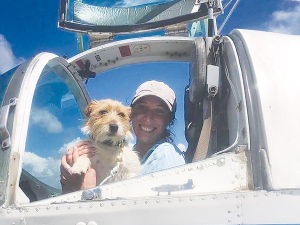Aerospread/Super Air pilots are usually busy at this time of the year flying superphosphate onto farms along the east coast of the North Island.
But Cyclone Gabrielle changed all that.
Aerospread, based out of the Napier airport serving customers from Tairawhiti down to the Wairarapa and into the Manawatu, is now part of the Super Air team. The companies had joined forces right before Cyclone Gabrielle unleashed its savage heavy rain and wind on the east coast and the spreading of fertiliser abruptly stopped.
Bruce Peterson says the last CAA statistics in 2022 showed that fertiliser spread from aircraft dropped back 66% on the previous year and it is still dropping.
"We had a farmer who normally puts on about 600 tonnes of fertiliser, but he dropped back to 300 due to the economic climate and when Gabrielle came along he decided to abandon the deal," he told Rural News.
According to Peterson, farmers only have so much cash and as a result of Gabrielle they are re-prioritising what they do with that. He says clearly re-instating fences, tracks, culvers, bridges, sheds and other farm infrastructure has to be their priority.
Peterson says getting back to anything that resembles normal has been hard for people living in isolated communities where power, roads and communications have been down. This is where Aerospread/Super Air and other air operators have swung into action and provided a lifeline to these people.
"We worked together providing relief to farmers in need with the newly formed team coming together as one - something we are proud of," he told Rural News. "We took out the hopper of our aircraft creating a floor that enabled us to carry all sorts of things ranging from blankets, essential medication, electric fence standards, generators and fuel which was in 20 litre jerry cans."
Peterson says fuel was vital to farmers, to run generators for their freezers and fuel their side by sides and utes so they could at least get around their properties and assess the damage.
He adds that the company's pilots were also flying in much needed supplies and other staff and their families pitched in to package goods so they could fit in the aircraft easily.
"It was a great team effort."
Peterson says the cost of flying in the much-needed supplies was picked up by the company owners Super Air and at no cost to farmers.
"We value our rural communities and clients, this was our chance to help them in a time of need," he says.
Flying Jerry Cans
For the pilots, the so-called 'jerry can flights' were a challenge.
Peterson says normally aircraft take off from an airstrip with a full load of fertiliser and land when the aircraft is empty. But he says having to land a heavily laden aircraft on a farm airstrip called for good and careful planning and flying skills. The entire operation went off without a hitch.
Peterson says one clear message to come out of this emergency was the value of having good quality, all-weather airstrips with good length and access. These are a real asset to rural communities.


















